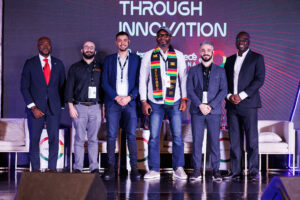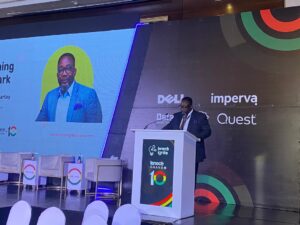…as Tenece Ghana celebrates 10th anniversary
By Juliet ETEFE ([email protected])
The Chief Executive Officer of Tenece Group, Kingsley Eze, has stressed the importance of innovation in driving growth and fostering leadership in the technology sector.
Speaking at Tenece Ghana’s 10th anniversary, he said businesses could stay ahead of the competition through continuous innovation, particularly in an artificial intelligence (AI) driven world.
He noted that while AI has shifted from science fiction to a powerful agent of change, businesses must lead by staying ahead of the curve.
“To lead in technology, you need to innovate. To lead in technology, you need to shape what is happening in the environment and adapt and change as much as possible. You need to build your extensive innovation capabilities to make sure you remain at the forefront.
“Innovation is the key to staying relevant in this AI-driven world. It is about adapting and evolving with the technology,” he said, adding that companies must build strong governance structures around AI to harness its full potential.
He also added that businesses must not only adopt AI, but ensure their teams are well-prepared to leverage it effectively.
He stressed that governance, training and a commitment to continuous innovation are vital for companies that want to stay competitive.
Mr. Eze was speaking at Tenece Ghana’s 10th-anniversary on the topic ‘Embracing the Future of Work: Adapting to AI, Automation, and Remote Collaboration to Scale Business Models’, where he and other panelists shared insights on how organisations can leverage emerging technologies to thrive.

The conversation also delved into the role of cyber-security, data privacy and strategic partnerships in navigating the digital landscape, emphasising the need for businesses to be agile, innovative and customer-focused to capitalise on the opportunities presented by the digital age.
The discussion underscored the urgency for businesses to innovate, adapt to AI and ensure robust data security as they navigate the future of work.
Sales Engineer at Imperva, Nedal Nael, delved into the intersection of AI and cyber-security, pointing out the increasingly critical role AI plays in enhancing detection systems and incident response times.
He stressed that companies should focus on putting data privacy or protection in place and strong governance frameworks to enhance their cyber-security posture in the face of growing cyber threats.
Samuel Okerchiri, Chief Information Officer at Dell Technologies Central West Africa, emphasised that AI should not be feared as a tool that will displace human jobs; but rather as a means to enhance human capacity in the workplace.
Mr. Okerchiri noted that AI’s real value lies in assisting employees in working more efficiently by automating repetitive tasks and providing critical data analysis in real time.
For businesses to thrive, he said employees must be educated and equipped to use AI technologies effectively, creating a synergy between human intelligence and machine learning.
With more employees working from various locations, Bradley Du Preez, Pre-sales Identity Business Unit Lead for Sub-Saharan Africa, highlighted how organisations must focus on controlling access to sensitive data through robust identity management solutions.
He suggested that businesses need to adopt technologies that provide real-time insights into access patterns to mitigate potential security risks, ensuring that remote collaboration does not expose companies to vulnerabilities.
Rudi Delport, Presales Engineer at Microsoft for Africa, Middle East and Turkey, highlighted the need for organisations to adapt their security protocols to cater for the post-pandemic shift toward remote and hybrid work.
He noted that businesses must invest in identity-driven security measures, focusing on who is accessing company data, where it is being accessed from and what actions are being taken with that data.
As businesses continue to embrace the future of work, Mr. Delport stressed that companies must remain vigilant about cyber-security, particularly in the context of widespread remote access to critical resources.

Building resilience
The second panel on ‘building resilient enterprises in a harsh economic climate’ saw panelists emphasising that businesses be proactive, adaptable and customer-centric to survive and thrive in uncertain times.
They also stressed the importance of strong leadership, strategic decision-making and agility in responding to crises such as currency fluctuations, political instability and global disruptions like COVID-19.
Cyber-security was also a key topic, with panelists reiterating the importance of investing in security infrastructure to protect a company’s reputation and avoid costly breaches.
The panelists included Okechukwu Eze, Managing Director, Tenece Cross-Border Subsidiaries; Ayo Erghagbai, Executive Director, Business Services and Operations, Tenece; Jonathan Dartey, Country Manager, Tenece Ghana and Ivory Coast; Abel Lomotey Daitey , Chief Information Officer, GCB Bank PLC; and Walid Bou Abssi, Country Manager, Nigeria and Ghana, Shelt Global Limited.
Tenece Ghana’s 10 years
Marking a decade of excellence, innovation and provision of technological solutions, Tenece Ghana reassured of its commitment to driving change and growth across industries through advanced technology.

Country Manager for Tenece Ghana and Ivory Coast, Jonathan Dartey, emphasised the company’s position as a leader in technology solutions across West Africa, driving innovation in storage, automation, security and cloud technology.
He attributed Tenece’s achievements to strong partnerships and collaboration, which have been integral to its growth.
He noted: “Today, we come together to celebrate not only our remarkable journey over the past decade, but also to look forward to the exciting future ahead”.
“For the past ten years, Tenece Professional Services has proudly stood at the forefront of technology solutions in West Africa. From Storage, Automation and Security to Cloud technology, we have not only envisioned a future where advanced technology drives meaningful change, but have actively shaped it,” he stated.










